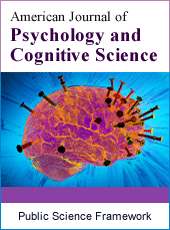American Journal of Psychology and Cognitive Science
Articles Information
American Journal of Psychology and Cognitive Science, Vol.4, No.3, Sep. 2018, Pub. Date: Aug. 10, 2018
Effectiveness of Test Time on Anxiety and Cognitive Distortions in Students Sepidan Branch Islamic Azad University
Pages: 31-35 Views: 2211 Downloads: 639
[01]
Alireza Yazdanpanahi Ardakani, Department of Psychology, Yasooj Branch, Islamic Azad University, Yasooj, Iran.
[02]
Ali Naseri, Department of Psychology, Firoozabad Branch, Islamic Azad University, Firoozabad, Fars, Iran.
The purpose of this study was to investigate the effect of time on anxiety and cognitive distortions of Students of Sepidan University of Medical Sciences. The research method was semi-experimental, pre-test, and post-test with two experimental groups and one control group. The community included all male electrician-electronics students (75 students). After pre-test, they were randomly assigned to three groups (low time group, high test group and control group) (each group was 35 students). The research tools were anxiety inventory and cognitive faculty distortion questionnaire. The research method was that after all three groups were matched based on practical intelligence and academic achievement, a pre-test was performed. All three groups were asked to answer a general information questionnaire. The group was told that the 30 minutes were responding to the questionnaire. The group was told that they were 60 minutes long to respond to the questionnaire and told the control group that their response time is unlimited. Then anxiety and cognitive distortion questionnaires were immediately applied as a post-test for all three groups. The data from the questionnaires were analysed using one-variable covariance analysis. The results showed that the low test time increased anxiety and cognitive distortions of all or no, generalized exaggerated, subjective filtering, neglect of positive, concurred conclusions, coarse-nose-thumbnail, sensory reasoning, need-no-nonsense and Glued But the exam's time did not affect the personalization cognitive distortion. On the whole, it is concluded that the score that an individual receives from examining questions is not merely influenced by the person's ability, but the exam time and the resulting anxiety also affect the score of the century by individuals from answering questions.
Test Time, Anxiety, Cognitive Distortions
[01]
Arana, G, & Furlan, L. (2016). Groups of perfectionists, test anxiety, and pre- exam coping in Argentine students. Personality and Individual Differences, 90, PP: 169-183.
[02]
Beck, A. T. (1976). Cognitive therapy and the emotional disorders. New York: International Universities Press.
[03]
Clark, D. M. & Wells, A. A. (1996). Cognitive model of social phobia. In: R. G. Heimberg MRL, D. A. Hope, & F. R. Schneier, editor. Social Phobia: Diagnosis, assessment, and treatment. New York, NY: Guilford press.
[04]
Huntley. D., Young, B., Jha, V., & Fisher, L. (2016). The efficacy of interventions for test anxiety in university students: A protocol for a systematic review and meta- analysis. International Journal of Educational Research, 77, PP: 92-98.
[05]
Hashemi Zadeh, Hayedeh. (2006). The Study of the Relationship between Time Management and Job Stress Behaviors in Head Nurses in Internal Wards and Surgery of Educational Hospitals affiliated to Shahid Beheshti University of Medical Sciences and Health Services. Master's Thesis, Shahid Beheshti University, Tehran.
[06]
Khayyer, Mohammad. And Ostovar, S. (2007). Relationship between social anxiety and cognitive biases in adolescents. Journal of Psychiatry and Clinical Psychology, 13 (3).
[07]
Khalaila, R. (2014). The relationship between academic delf- cocept, intrinsic motivation. Tobias, S. (1986). Anxiety and Instraction. Which Skills are "Life Skills? From WWW. Life Skills – Based Education.
[08]
Raja Mahmoud Jihan S. & Staten Ruth Hall Lynne A. (2012). The relationship among young adult college students' depression. Anxiety, stress, demographic, life satisfaction, and coping styles. Issue in mental health nursing, 33 (3): 149-156.
[09]
Spielberger, C. D. (1972). Anxiety as an emotional states in C. D. Spielberger. Anxiety: current trends in theory and Research, New Yourk: Academic press.
[10]
Strikland, O. Glimba. M. (2011). Mnaaging time: the effect of personal goal setting on resource all ocations. The Journal of Psychology. 134-153. Test anxiety, and academic achievement among nursing students: Mediating and moderating effects. Nurse Education Today, xxx, PP: 1-7.
[11]
Tobias, S. (1986). Anxiety and Instraction. Which Skills are "Life Skills? From WWW. Life Skills – Based Education.
[12]
Yaghobi, Abul Ghasem. Researcher, Hussein. Mystical, nasrallah. And al-Fati, Venus. (2013). The Effect of Time Management Training on Reducing Test Anxiety among First-grade Female Students in Hamedan High School. Journal of Ilam University of Medical Sciences, Volume 21, Number 1.
[13]
Wine, J. D. (1980). Cognitive- attentional theory of test anxiety. In I. G. Sarason, test anxiety, theory, research and applications. Hillsdale. Nj: Erlbaun.
[14]
Zatz, S., & Chassin, L. (1985). Cognition of test- anxious children. Journal of Consulting and Clinical Psychology, 51, 529-534.

ISSN Print: 2381-7453
ISSN Online: 2381-747X
Current Issue:
Vol. 6, Issue 2, June Submit a Manuscript Join Editorial Board Join Reviewer Team
ISSN Online: 2381-747X
Current Issue:
Vol. 6, Issue 2, June Submit a Manuscript Join Editorial Board Join Reviewer Team
| About This Journal |
| All Issues |
| Open Access |
| Indexing |
| Payment Information |
| Author Guidelines |
| Review Process |
| Publication Ethics |
| Editorial Board |
| Peer Reviewers |


